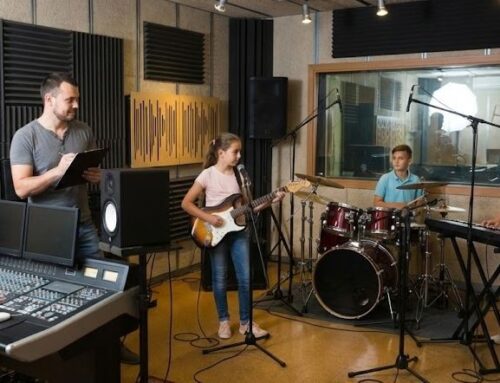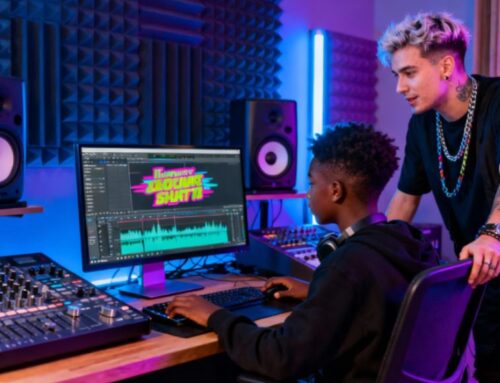Learning to sing is an enriching experience that opens doors to artistic expression and personal fulfillment. For many aspiring vocalists, the question of how long it takes to develop their singing skills is a common concern. The path from being a novice to achieving a high level of proficiency can vary significantly based on various factors, including the frequency of lessons, the quality of instruction, and consistent practice. This article will provide a detailed overview of the typical progression from complete beginner to advanced vocalist, as well as insights on effective practice routines that can help you reach your goals.
If you’re in Burlington, ON and considering music lessons, think Capstone Music! Our teachers are performing vocalists that can teach both the technical side of signing, as well as share performance experience and tips. Sign up for singing lessons today! (And yes, our singing lessons are for adults, too!)
1. Starting as a Complete Beginner
Understanding the Beginner Stage A complete beginner is someone who has little to no experience with singing or vocal training. At this stage, the focus is primarily on foundational skills, such as developing proper breath control, pitch recognition, and vocal warm-up techniques. Beginners will also learn basic music theory concepts and how to care for their voice to prevent strain and injury.
Typical Timeline to Reach This Level Most individuals can expect to reach a beginner level in about 1-3 months of consistent weekly lessons and practice. This typically involves 20-30 minutes of practice each day, 5-6 days a week. By the end of this initial stage, you should be able to sing simple melodies, recognize pitches, and understand basic musical notation.
Practice Tips for Beginners:
- Vocal Warm-Ups: Start each practice session with vocal warm-ups to loosen your vocal cords and prepare your voice.
- Breathing Exercises: Practice diaphragmatic breathing to improve your breath control.
- Simple Songs: Choose easy songs to build confidence and apply what you’ve learned.
2. Progressing to Intermediate Skills
Defining the Intermediate Stage As you advance to the intermediate level, your vocal skills will begin to flourish. Intermediate singers can sing with more confidence and expressiveness, and they’ll be introduced to more complex techniques such as vocal dynamics, phrasing, and emotional interpretation. You will also explore harmonies and learn to sing in different styles, expanding your versatility as a vocalist.
Typical Timeline to Reach This Level Reaching an intermediate level usually takes around 1-3 years of dedicated practice and instruction. By this point, you should be practicing approximately 30-45 minutes a day, 5-6 days a week. Your ability to perform a variety of songs and express emotions through your voice will also improve significantly.
Practice Tips for Intermediate Singers:
- Expand Repertoire: Begin working on a diverse set of songs across different genres to enhance your adaptability.
- Breath Control Techniques: Focus on exercises that strengthen your breath support and control.
- Vocal Health: Continue to prioritize vocal health by staying hydrated and resting your voice when needed.
Did you know? Studies show that taking up singing lessons offers a multitude of health and wellness benefits to you later in life?
3. Achieving Advanced Vocal Skills
What It Means to Be Advanced An advanced singer possesses a high level of technical skill and artistic expression. At this stage, you will be able to tackle complex pieces, demonstrate excellent vocal control, and convey emotion in your performances. Advanced singers can also explore advanced vocal techniques such as belting, vibrato, and resonance.
Typical Timeline to Reach This Level Typically, it takes 5-10 years to reach an advanced level with regular weekly lessons and diligent practice. Advanced singers generally practice for 1-2 hours a day, focusing on refining their vocal techniques, expanding their range, and preparing for performances.
Practice Tips for Advanced Singers:
- Technical Exercises: Engage in challenging vocal exercises to enhance your range and control.
- Performance Practice: Regularly perform in front of an audience, whether it’s at open mic nights, recitals, or community events, to build stage presence.
- Record Yourself: Recording your singing can help you identify areas for improvement and track your progress over time.
4. Becoming a World-Class Vocalist
What It Means to Be World-Class A world-class vocalist has honed their skills to the highest degree, mastering both technique and artistry. These singers can perform complex repertoire with ease and have developed a unique voice that captivates audiences. They often engage in professional performances, recording sessions, and competitions at national and international levels.
Typical Timeline to Reach This Level Achieving a world-class level typically requires 10-20+ years of dedicated practice and training. Many professional singers devote 4-6 hours a day to practice and performance preparation, continually refining their craft and exploring new musical horizons.
Practice Tips for Aspiring World-Class Singers:
- Collaborate with Experts: Work with accomplished vocal coaches and take part in masterclasses to gain insights from industry professionals.
- Diverse Genres: Explore various musical styles to develop versatility and find your unique sound.
- Continuous Learning: Stay open to feedback and continuously seek opportunities for growth, such as attending workshops or taking part in vocal competitions.
Weekly Lessons and Effective Practice Time
Regardless of your current level, regular lessons are crucial for structured learning and guided progress. Here’s an outline of what an ideal weekly practice schedule might look like at different stages:
- Beginner Level: Lesson Time: 30 minutes to 1 hour per week. Practice: 20-30 minutes per day, focusing on vocal warm-ups, breath control, and simple melodies.
- Intermediate Level: Lesson Time: 1 hour per week. Practice: 30-45 minutes per day, incorporating vocal exercises, song repertoire, and breath control techniques.
- Advanced Level: Lesson Time: 1 hour+ per week, possibly with a specialized instructor. Practice: 1-2 hours per day, focusing on advanced techniques, vocal repertoire, and performance skills.
- World-Class Level: Lesson Time: Regular coaching sessions, often with renowned instructors. Practice: 4-6 hours per day, including technical exercises, performance preparation, and interpretation work.
Factors That Influence Your Learning Speed
Your progress as a singer will be influenced by several factors: consistency of practice, quality of vocal instruction, age, and previous musical experience. Regular, focused practice is more effective than sporadic long sessions. Having a skilled teacher can provide guidance, support, and accountability as you work to build your skills. While younger students may learn faster due to greater neural plasticity, adults can also achieve remarkable results with dedication and commitment. If you have previous experience in music or other vocal styles, you may progress more quickly as well.
Embrace Your Singing Journey
Embarking on the journey to becoming a skilled singer is a deeply personal experience that unfolds over time. The rate of progress can vary widely among individuals, but with perseverance, regular practice, and quality instruction, anyone can achieve their vocal aspirations. Whether you aspire to perform in a choir, sing at family gatherings, or grace the stages of major venues, it’s essential to enjoy the process, celebrate your achievements, and nurture your passion for singing. Remember, each step you take on this journey brings you closer to mastering your voice and expressing yourself through music.






